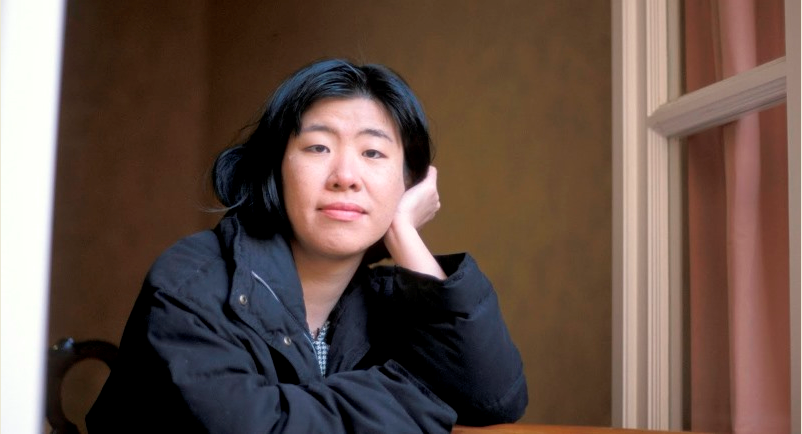Writers Who Inspire Us: Banana Yoshimoto and the Beautiful Sadness of Loss
Banana Yoshimoto was my first Japanese love and opened the door to discovering more of my now favorite authors, including Hiromi Kawakami and Haruki Murakami. I should refer to her as Yoshimoto, but the urge to keep writing Banana is too delicious. Her nom de plume came from her love of banana flowers, she even has the flower tattooed on her thigh, and because she found it cute and purposefully androgynous. Her debut book Kitchen (1988, English translation 1993) won the Kaien Newcomer Writers Prize, the Umitsubame First Novel Prize, the Izumi Kyoka Literary Prize, and had over sixty printings in Japan and sold millions of copies worldwide. The hoopla over her work became known as Bananamania. I confess, I have Bananamania.
I discovered Banana when I needed her most. I was in my twenties and still grieving the death of my father years earlier. I was haunted by dreams that he was still alive, but I couldn’t find him. I read Kitchen and Moonlight Shadow, both published in one slim volume that packs a huge emotional impact. Reading Moonlight Shadow was like reading my own journal, at once deeply intimate and universal. Banana writes about grief without sentimentalism, but with an understated candor, as if she is sharing an intimate conversation with a dear friend. She deftly portrays the numbness, the urge to fall into deep slumber and never wake, and the dream-like state of mourning. For the first time since losing my father, I felt someone understood the particular vein of grief I experienced. I sobbed while reading it and still cry with every re-read. I have gifted or loaned the book to friends who have suffered loss, hoping they too could find solace in its pages.
Banana identifies her main themes as urban existentialism, especially of young people in contemporary Japan, and how bad experiences shape a person's life. But her stories do not dwell on these depressing events, rather they gently flow through the emotional state of her characters in atmospheric reverie. Some of Banana’s subsequent books after Kitchen fared well in the U.S., while others were criticized for being simplistic. Rather than simplistic, I would describe her work as concise and elegant, like haiku.
Her writing is suffused with poetic imagery in the Japanese aesthetic of mono no aware, the awareness that all things are ephemeral and the appreciation for the bittersweet experience of something fleeting and wonderous. The phrase loosely translates to “the pathos of things” or better yet, “the ahh-ness of life,” evoking that beautiful sadness of the passing of people and things—like the short-lived joy of the cherry blossoms, which bloom and then blow away on the breeze. Satsuke, the narrator of Moonlight Shadow, arrives at a riverbank just before dawn. “The last few stars in the porcelain blue sky winked, a dim white, as if about to go out. . . . So blue it feels like it could melt right into your body.” Against this night sky turning to dawn and the roaring river, she has a mystical experience that helps her accept a great loss. “The flow of time is something I cannot stop. I haven’t a choice. I go.”
Banana’s work reflects the Buddhist acceptance of the impermanence of life and goal of letting go of attachments to transient things. This is the lesson Banana’s protagonists must learn. They swim through deep pain amidst “the tempest of shock” knowing they must move on, while never forgetting what they have lost. “If a person hasn’t ever experienced true despair, she grows old never knowing how to evaluate where she is in life; never understanding what joy really is. I’m grateful for it.”
Starting with her earliest works in the 1980s Banana has included gender nonconforming characters. In Kitchen the main character’s surrogate mother is a transgender woman, in Moonlight Shadow a teenaged boy mourns his dead girlfriend by wearing her school uniform—bold choices for the time. In a 2015 interview with Tishani Doshi for The Hindu, Banana addressed gender ambiguity in her work. “I’m interested in the ways in which people can express their souls. In who they really are deep inside. Growing up as a young adult, I had many friends who were undifferentiated gender wise, not totally men, not totally women. They found it difficult to express themselves, so I thought I could write for them… I think the way society is right now is ephemeral; reflections of what humans might be, possibilities, so I try to focus instead on the human soul, rather than how a person appears.”
Spiritual and supernatural elements imbue her books, like those of Kawakami and Murakami, where spirits, ghosts, advanced cognition are accepted as a normal part of life. The 1994 novel Amrita features a young boy with prescience and a woman whose singing calls spirits from across the sea to listen. Her most mystical novel The Lake (2005) features a brother and sister who lived through a traumatic cult experience and are seers. The sister lives in an altered state of consciousness and her brother speaks for her, receiving her messages telepathically. My own writing includes the mystical and eerie and I appreciate how Banana infuses this quality in her work with openness, curiosity, and no trace of sensationalism.
Many of her twenty books have yet to be translated into English and I impatiently await my next Banana fix. Banana Yoshimoto paved the way for the next wave of Japanese women writers like Sayaka Murata and Mieko Kawakami. And she inspires this writer to talk openly about grief, ephemeral beauty, and the sensations that linger long after our loved ones are gone.

